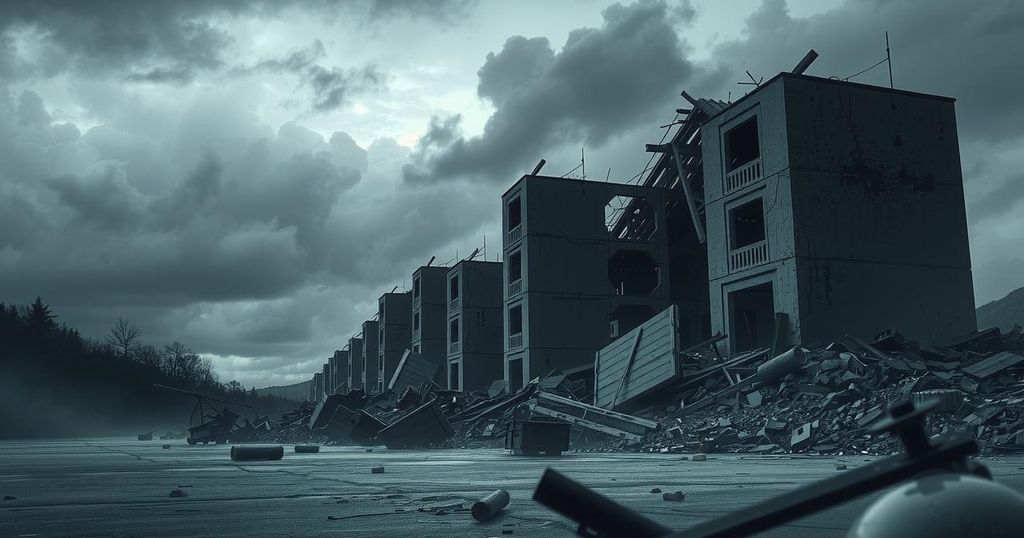Tragedy Strikes as Gaza Pediatrician Loses Family in Air Strike

A pediatrician in Gaza, Dr. Alaa Al-Najjar, lost nine of her ten children in an Israeli air strike on her home. Her husband was critically injured, and their only surviving son underwent surgery. Medical personnel have described the scene as horrific, raising concerns about the escalating humanitarian crisis in the region. The UN warns that the situation may worsen as aid falls short of what is crucial for the population’s survival.
A pediatrician in southern Gaza, Dr. Alaa Al-Najjar, has faced an unimaginable tragedy after an Israeli air strike destroyed her family home, claiming the lives of nine of her ten children. At the time of the attack, Dr. Al-Najjar was working at the Nasser Medical Complex in Khan Younis, where her husband, Dr. Hamdi Al-Najjar, suffered critical injuries. Their only surviving child, an 11-year-old boy, underwent emergency surgery on Friday due to severe wounds.
Dr. Muneer Alboursh, the director general of Gaza’s Hamas-run health ministry, commented on the grave situation: “This is the reality our medical staff in Gaza endure. Words fall short in describing the pain. In Gaza, it is not only healthcare workers who are targeted; Israel’s aggression goes further, wiping out entire families.”
Graphic footage released by the Palestinian Civil Defense and later verified by outlets including the BBC depicts the harrowing scene of rescue workers pulling lifeless children from the rubble of a collapsed building in Khan Younis. Dr. Graeme Groom, a British surgeon volunteering at Nasser hospital, shared the emotional weight of treating Dr. Al-Najjar’s injured son, mentioning his youth and severity of injury.
“He seemed much younger as we lifted him onto the operating table,” Dr. Groom noted in one of his social media videos. He also emphasized that Dr. Al-Najjar’s family has no political or military ties and thus described the attack as particularly tragic. “It is unimaginable for that poor woman, both of them are doctors… and yet his poor wife is the only uninjured one, who has the prospect of losing her husband,” Groom added.
Youssef Al-Najjar, a relative, made an emotional plea to the international community, stating: “Enough. Have mercy on us. We plead to all countries, the international community, the people, Hamas, and all factions to have mercy on us. We are exhausted from the displacement and the hunger.” His words echoed the dire situation many face in war-torn Gaza.
Dr. Victoria Rose, another British doctor working at the same hospital, speculated the explosions might have been exacerbated by a nearby petrol station. She remarked, “That is life in Gaza. That is the way it goes in Gaza.” The Israel Defence Forces and their general statements indicated a significant escalation in operations, having targeted over 100 sites in Gaza during a recent 24-hour period.
In stark contrast, the Hamas-run health ministry reported at least 74 Palestinian deaths due to the strikes in that same period. The United Nations has raised alarms that Gaza may be on the brink of its most harrowing phase of conflict, with Secretary-General Antonio Guterres condemning Israel’s restrictions on aid as contributing to a burgeoning humanitarian crisis.
Despite a partial lifting of the blockade, the availability of aid remains woefully inadequate. The UN projects that the territory requires 500–600 trucks of supplies daily to meet essential needs for its 2.1 million inhabitants. Since Israel initiated its military offensive following an incursion by Hamas militants on October 7, 2023, the fallout has been catastrophic. Gaza’s health ministry estimates over 53,000 Palestinian deaths, including significant numbers of women and children, although the figures do not distinguish between civilians and combatants.
The catastrophic air strike on the Al-Najjar family highlights the devastating toll of the ongoing conflict in Gaza. Medical professionals are not spared from the violence, and families are left to pick up the pieces following such tragedies. The humanitarian situation continues to deteriorate, with aid efforts insufficient to meet the urgent needs of the population. As the conflict escalates, the international community faces a pressing dilemma in addressing the situation.
Original Source: www.arabnews.com








